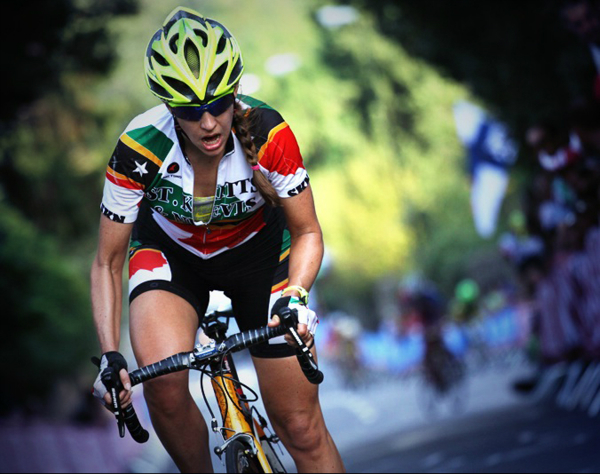
Professional cyclist and activist Kathryn Bertine makes a case for the growth of her sport in new documentary (photo by George Deswijzen)
HALF THE ROAD: THE PASSION, PITFALLS AND POWER OF WOMEN’S PROFESSIONAL CYCLING (Kathryn Bertine, 2014)
Cinema Village
22 East 12th St. between University Pl. & Fifth Ave.
April 18-24
212-924-3363
www.halftheroad.com
www.cinemavillage.com
 In her 2010 book Good as Gold: 1 Woman, 9 Sports, 10 Countries, and a 2-Year Quest to Make the Summer Olympics, athlete and journalist Kathryn Bertine detailed her attempts to participate in the 2008 Summer Games in Beijing. A former figure skater who shared her experiences on ice in 2003’s All the Sundays Yet to Come, Bertine has now made her first documentary, Half the Road: The Passion, Pitfalls & Power of Women’s Professional Cycling. Filmed for less than $10,000 and then funded by an Indiegogo campaign to produce, distribute, and market the final product, the film is a call to action to finally put women’s cycling on equal footing with the men’s tour a full four decades after Title IX. A successful professional cyclist herself, Bertine speaks with gold medalists Kristin Armstrong and Marianne Vos, such other pro cyclers as Emma Pooley, Amber Pierce, Robin Farina, Connie Carpenter Phinney, and Nicky Wangsgard, four-time Ironman triathlon world champion Chrissie Wellington, gender-busting Boston Marathoner Kathrine Switzer, and former U.S. surgeon general Richard Cardona, who all argue for equality in women’s cycling, from base pay and winner’s shares to corporate sponsorship and media coverage. Narrated by former professional cyclist Bob “Bobke” Roll, Half the Road places a particular focus on establishing a women’s Tour de France held on the same course at the same time as the men’s competition. But one of the primary roadblocks standing in their way is the Union Cycliste Internationale, whose 2013 road commission president, Brian Cookson, explains that the women’s part of the sport lacks the necessary financial drivers to make that happen. It becomes a kind of chicken vs. egg battle that plays out more like an episode of HBO’s Real Sports than a theatrical film, a determinedly one-sided version of the situation that, though honest and heartfelt, grows repetitive over its too-long 106 minutes. Bertine sees the film as about not just cycling but equality and society in general, but she ends up taking too narrow a road.
In her 2010 book Good as Gold: 1 Woman, 9 Sports, 10 Countries, and a 2-Year Quest to Make the Summer Olympics, athlete and journalist Kathryn Bertine detailed her attempts to participate in the 2008 Summer Games in Beijing. A former figure skater who shared her experiences on ice in 2003’s All the Sundays Yet to Come, Bertine has now made her first documentary, Half the Road: The Passion, Pitfalls & Power of Women’s Professional Cycling. Filmed for less than $10,000 and then funded by an Indiegogo campaign to produce, distribute, and market the final product, the film is a call to action to finally put women’s cycling on equal footing with the men’s tour a full four decades after Title IX. A successful professional cyclist herself, Bertine speaks with gold medalists Kristin Armstrong and Marianne Vos, such other pro cyclers as Emma Pooley, Amber Pierce, Robin Farina, Connie Carpenter Phinney, and Nicky Wangsgard, four-time Ironman triathlon world champion Chrissie Wellington, gender-busting Boston Marathoner Kathrine Switzer, and former U.S. surgeon general Richard Cardona, who all argue for equality in women’s cycling, from base pay and winner’s shares to corporate sponsorship and media coverage. Narrated by former professional cyclist Bob “Bobke” Roll, Half the Road places a particular focus on establishing a women’s Tour de France held on the same course at the same time as the men’s competition. But one of the primary roadblocks standing in their way is the Union Cycliste Internationale, whose 2013 road commission president, Brian Cookson, explains that the women’s part of the sport lacks the necessary financial drivers to make that happen. It becomes a kind of chicken vs. egg battle that plays out more like an episode of HBO’s Real Sports than a theatrical film, a determinedly one-sided version of the situation that, though honest and heartfelt, grows repetitive over its too-long 106 minutes. Bertine sees the film as about not just cycling but equality and society in general, but she ends up taking too narrow a road.